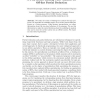3653 search results - page 35 / 731 » Learning of Partial Languages |
123
click to vote
PLDI
1995
ACM
1995
ACM
Interprocedural Partial Redundancy Elimination and its Application to Distributed Memory Compilation
15 years 6 months ago
Partial Redundancy Elimination
PRE
is a general scheme for suppressing partial redundancies which encompasses traditional optimizations like loop invariant code motion and redun...
118
Voted
ENTCS
2006
15 years 2 months ago
2006
Partially Ordered Symbolic Automata (POSAs) are used as the semantical foundation of visual formalisms like the scenario based language of Live Sequence Charts (LSCs). To check whe...
118
Voted
ATAL
2005
Springer
15 years 8 months ago
2005
Springer
We present the agent programming language POGTGolog, which combines explicit agent programming in Golog with game-theoretic multi-agent planning in a special kind of partially obs...
128
click to vote
ESOP
1998
Springer
15 years 6 months ago
1998
Springer
Abstract. We study the notion of binding-time analysis for logic programs. We formalise the unfolding aspect of an on-line partial deduction s a Prolog program. Using abstract inte...
115
click to vote
JOLLI
2008
15 years 2 months ago
2008
Abstract. This paper uses a partially ordered set of syntactic categories to accommodate optionality and licensing in natural language syntax. A complex but well-studied data set p...

